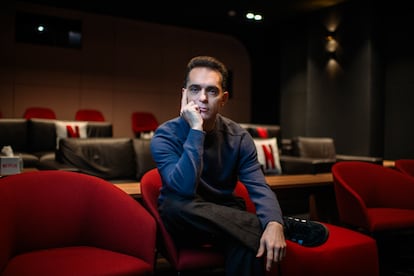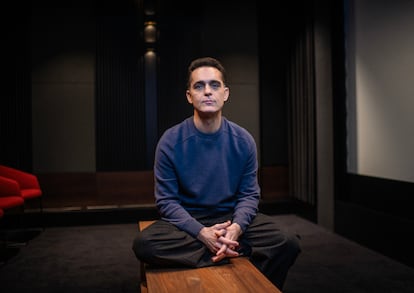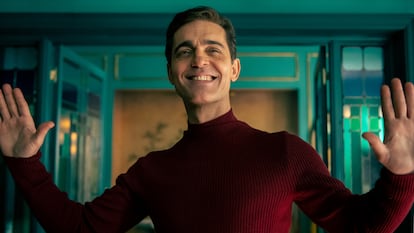Actor Pedro Alonso: ‘Berlin is indecent, perverse, selfish, narcissistic, an emotional terrorist and a manipulative liar’
The actor, who became world-famous with ‘Money Heist,’ now stars in his own series, ‘Berlin’

When Pedro Alonso was just over 30 years old, he thought that his acting career was over. Now he is the star of Berlin. Because, even though his character died in Money Heist, it made such an impression on the viewers that they had to find a way to bring it back. This talk, at the Netflix offices in Madrid, Spain, began with his new series before steering towards more philosophical territories. “I’m a guy with a transcendent calling,” he says.
Question. How is the Berlin from Berlin different from the one we saw in Money Heist?
Answer. I feel as if Álex [Pina] and Esther [Martínez Lobato, the creators of the series] put us through a wormhole and we appeared in a different universe. The most delicate question was what the tone of the series was and, for me, that this evolution didn’t undermine the character’s DNA, but also that that DNA was not a burden that prevented me from [having fun with it]. It really put me to the test, but that is a constant in everything that has happened to me with this adventure. The character was alive, he pushed some very interesting buttons in terms of danger, density, that shady energy, and he is making a journey towards something lighter and brighter and younger. It is absolute absurdity. No one could have written a progression of that caliber if we weren’t working towards the unknown. In terms of style, it has been very delicate. A walk on a tightrope. But I’m a sucker for a challenge and some good conversation, and we had a few of those this year.
Q. Didn’t you hesitate? There is always the risk of dying of success. He is a character who died, then came back, and now he is the protagonist of his own show…
A. I was one of the least worried about making him the protagonist. I know that there was some concern, he is a very particular character, who almost always works on the fringes — but if we put him in the center, is it going to be too much? In my case, my doubts had more to do with whether the kite could lose its connection to the ground… There was a moment of great vertigo during the first month and a half of filming; there was a very critical week. But then I felt it click, and at this point I know that the character had substance to keep developing it. Now I think I could put Berlin in a Shakespeare play and it would work.

Q. What is your relationship with Berlin? Do you like him?
A. He’s disgusting. The other day somebody asked me if I would have a drink with Berlin — and one drink, sure, but two, no. One because I am curious and I try to be open to any type of experience, but if you have two, you know what you’re getting into. He’s a disgrace, he’s indecent, perverse, selfish, narcissistic, an emotional terrorist, a manipulative liar… He’s the worst. But he always looks for a moment of genuine emotion, and sometimes he gets it. And of course, narratively speaking, he’s a gold mine. I myself am surprised at what I feel within the character. It’s total ambivalence. Fiction is not made to indoctrinate anyone; it is made to feel. It’s a reflection of our miseries and greatness and our worries and our sadness that, in addition, allows us to travel along paths that one would not usually dare.
Q. What did a hit like Money Heist mean for your career?
A. In recent years I have been able to confirm emphatically that life is made of cycles and there is no way to predict where anyone’s life is going. I am totally determined to break with the system of expectations, because it serves no purpose. I am settled in the present; often in amazement. I know it can pass quickly, because memory is very short, but it has allowed me to travel, to meet incredible people, to say no, to say no again and again, a lot.
Q. What a luxury.
A. Absolutely. I don’t want to go all Dalai Lama, but I haven’t prioritized money at all. I have stability and I see what can I invest it in, which is growth, my own work. And it has provided me with a stability that has given me a completely different side, a more indie journey, of a spiritual nature. It has given me a world of possibilities, and it has subjected me to very demanding problems as well, because the energetic shake-up has been quite heavy at times. And no one teaches you to handle that, that level of exposure, that level of pressure. But that’s neither good nor bad; it is what you make of it. I try to handle it in the way that seems most congruent with my way of being in the world, and then I disappear and do other things.

Q. It caught you at almost 50 years old. Did that help?
A. I’ve had time to realize that age and experience don’t guarantee stability in the face of something like this. I’ve seen some who I thought were going to be crushed and were not, and others who seemed super balanced and are real crazy. But beyond age, it caught me in a life cycle in which I was working a lot, and my priorities made me see it from a distance and have protocols to manage it and not take it for granted. I know this will pass, I am not condescending about whether entertainment is more or less than nothing. It is up to you to turn something into wealth or into your grave; I try to turn it into a garden, and that is work, it requires a lot of attention.
Q. What was the craziest thing you experienced with Money Heist?
A. Being in the Amazon, in the jungle, for two months, and then someone coming to look for you. Being chased by the Minister of Culture of Turkey because Erdogan wanted to take a picture with me. Some crazy things happened to me, it was like a hidden camera prank show. I’m a guy who isn’t allowed into places… and the next day, Erdogan’s Minister of Culture is chasing you. Life is a joke.
Q. And all with a show that had already ended.
A. Yes, yes, we had properly mourned. But since I died, things keep happening to me.
Q. You have said that you have had several work deaths.
A. When I was in my early thirties, I thought: the ship has sailed and it will never come back. Ruined, with a four-year-old daughter and without a clear perspective that would make me think I could get back on track. But in hindsight, that terrible year was one of the most interesting of my life. It forced me to hit the reset button, to start from another place. Life is about dismantling. It is assuming that life is cycles. And then the important thing is to tend to your own garden, to be aware of what your garden is, what is seen and what is not, what is wealth. Wealth is finding your garden, that it is healthy, that there is health in your environment, physical and in your relationships, that you know how to say no, and say no again, and say it as many times as necessary. I have fewer and fewer certainties. I try to be more open, more flexible to read the signs.

Q. How did you get out of that rut?
A. There are two tools that have been with me since then. One is meditation and the other is painting, which is basically the same. I meditate a lot, I paint a lot, I turn my work into something that passes through my hands, I paint, organize my house, clean my bathroom, take my bicycle, go get bread… I try to make my life look like what I understand to be a real life.
Q. Hasn’t playing Berlin since 2017 been too much of a constraint?
A. Narratively speaking, the character is an incredible gift. Until today, the source of vertigo was the energetic commitment, but in creative terms I’ve never had any doubts. And meanwhile, I’ve published a novel, I’ve been a producer, I’ve written a non-fiction series, I’ve traveled a lot. I live a simple life, I still write non-fiction, I want to write a script… There are actors who say, “I want different things.” Well, not me. What I want is for it to have substance. Displaying lots of versatility is not my priority. I’m not obsessed with proving anything. I am interested in communication, I love it. I hope I can continue to find a space to keep growing and renewing. Everything else… things can fall into the hands of the ego, but I don’t want to prove anything; I want to learn and evolve.
Q. If you could go back in time and talk to the Pedro Alonso in his early thirties who thought his career was over, what would you say to him?
A. [Reflects for a long time.] I would tell him that he has to have self-love. I probably wouldn’t have understood. Look, I get goosebumps just by saying it. Much of what we do is not for us, it’s because we want to be loved… We live vicariously, and that is a lack of self-esteem. You have to learn to love yourself, and to love what lays hidden in that mountain of learned ideas, beliefs, aspirations, ambitions, that are not yours. Discover who’s there, under that mountain of rubble, and tell them “I love you, do whatever you want for yourself.” That’s why the success story is something that I rationalize a lot, because success is a projection of what success is supposed to be. I appreciate this favorable thing, and that people see this, but this is not success, it’s a fantasy. I would tell him, “Who are you? Love yourself.”
Sign up for our weekly newsletter to get more English-language news coverage from EL PAÍS USA Edition
Tu suscripción se está usando en otro dispositivo
¿Quieres añadir otro usuario a tu suscripción?
Si continúas leyendo en este dispositivo, no se podrá leer en el otro.
FlechaTu suscripción se está usando en otro dispositivo y solo puedes acceder a EL PAÍS desde un dispositivo a la vez.
Si quieres compartir tu cuenta, cambia tu suscripción a la modalidad Premium, así podrás añadir otro usuario. Cada uno accederá con su propia cuenta de email, lo que os permitirá personalizar vuestra experiencia en EL PAÍS.
¿Tienes una suscripción de empresa? Accede aquí para contratar más cuentas.
En el caso de no saber quién está usando tu cuenta, te recomendamos cambiar tu contraseña aquí.
Si decides continuar compartiendo tu cuenta, este mensaje se mostrará en tu dispositivo y en el de la otra persona que está usando tu cuenta de forma indefinida, afectando a tu experiencia de lectura. Puedes consultar aquí los términos y condiciones de la suscripción digital.









































